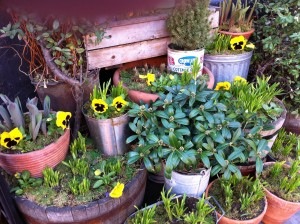Green It Up!

After a long – very long – and very harsh winter, it’s finally Spring. It even feels as though my house wants to take a deep breath of fresh air. We’ve been shut up indoors for so long – and so have our homes – gracefully taking in all of our cold germs, cooking odors, pet smells, deicing salt and mud, and every other remnant of our cloistered winter existence.
It’s Time For Spring Cleaning
The whole idea of Spring cleaning – the annual cleaning of your house from top to bottom in the first warm days of the year — is supported by many cultures. For example, for the past 3,500 years, observant Jews have done a thorough “spring cleaning” of their homes before the Passover holiday begins. It is traditional In Greece and other Orthodox countries to do the same before or during the first week of Lent – which is also called Clean Week.
In the spirit of greening and cleaning here are some environmentally sensitive suggestions to green and clean your kitchen whether you cook at home or feast on take-out. You eat well, so why not treat your kitchen and the environment well, too!
White Vinegar, Lemon, Salt and Baking Soda
So many petroleum based cleaning products can cause potentially serious health and environmental issues. Why not use natural, inexpensive, and safe wonder cleaners like white vinegar, lemon, salt, and baking soda?
I use white vinegar in water all of the time to clean my kitchen counter tops, stove, and even my tile floor. It cleans beautifully, is nontoxic, and smells like vinegar — not some nostril assaulting chemical mixture. Although some suggest using equal parts of water and white vinegar, I’m not so precise. I pour some vinegar and water in a spray bottle and keep it under my sink to use when I need it. Actually, vinegar and fresh lemon juice often serve the same purpose — but lemon has a citrusy scent that some people prefer.
For tougher stains, try making an all-purpose, non-toxic, stain-busting paste out of a mixture of vinegar and baking soda mixed with a little water. Baking soda, even on its own, is a great food-safe, odorless, and mildly abrasive green cleaning product and can be used just about everywhere (although not on waxed or easily scratched surfaces).
It’s great for cleaning up spills in the oven, on the stove-top, and for cleaning pots and pans when you forget to stir and let something burn the bottom of the pot. For oven spills, make a paste of baking soda and water, let it sit on the on the spill overnight, and scrub in the morning.
If you get to a spill – either in the oven or on the stove – right away, cover it with salt, let it sit for a few minutes, then wipe. The salt will absorb the liquid and is really good for absorbing grease and oil. Use salt to clean your coffee pot – just add 2 to 3 tablespoons to the pot and bring it to a boil.
You can also clean metal with a mixture of salt and lemon juice. My Uncle Charlie taught me this. Greeks make a New Year’s cake with a coin hidden in it. To clean the coin, Uncle Charlie would let it sit in a mixture of salt and lemon juice then rinse it and wipe it dry – something I do to this day. Aside from random coins, try it on your pots, pans, and appliances.
Then There’s The Red Wine Someone Spilled On The Carpet
Something really good to know is if a colored liquid, like red wine, spills on your carpet, dab up what you can with paper towels or a clean cloth and then cover the spill with salt. When it dries, vacuum it up. A friend taught me this when someone spilled red wine on my brand new light colored carpet. She calmly assured me that her Dad was in the carpet business and to go get the salt and dump it on the spill. Trust me, this works!
The Dishwasher As A Green Tool
Amazingly, a dishwasher uses half the energy, one-sixth the water, and less soap than if you wash dishes by hand. A report from the California Energy Commission says that you use, on average, 37% less water with a dishwasher than if you did dishes by hand under a continuous stream of water. But, if you fill one sink or basin with water to wash dishes and another to rinse rather than letting the water run, you’ll use half the water of a regular dishwasher.
And, one more plug for vinegar: using vinegar in the rinse cup of your dishwasher is an economical and environmentally friendly alternative to other kinds of rinse aids.